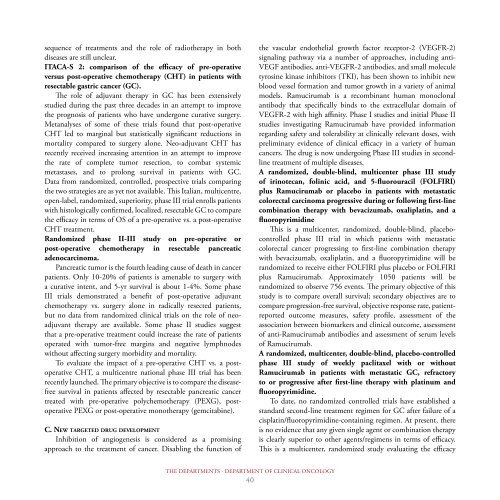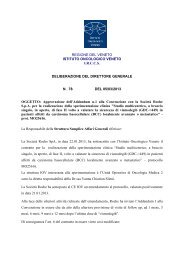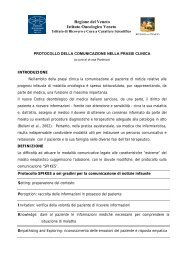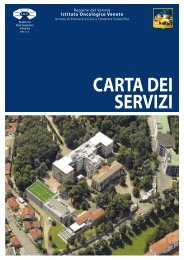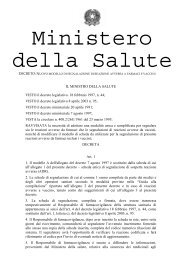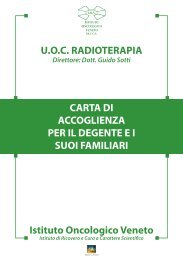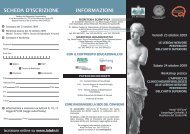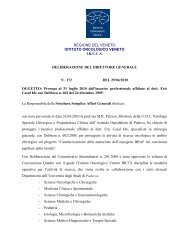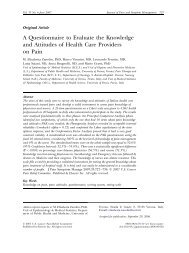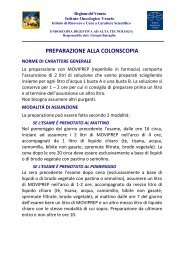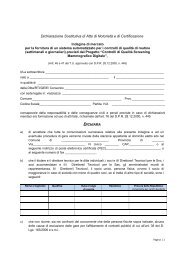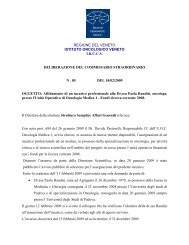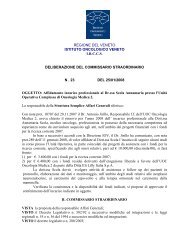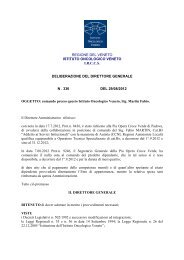SCIENTIFIC REPORT 2010 - 2011 - IOV
SCIENTIFIC REPORT 2010 - 2011 - IOV
SCIENTIFIC REPORT 2010 - 2011 - IOV
You also want an ePaper? Increase the reach of your titles
YUMPU automatically turns print PDFs into web optimized ePapers that Google loves.
sequence of treatments and the role of radiotherapy in both<br />
diseases are still unclear.<br />
ITACA-S 2: comparison of the efficacy of pre-operative<br />
versus post-operative chemotherapy (CHT) in patients with<br />
resectable gastric cancer (GC).<br />
The role of adjuvant therapy in GC has been extensively<br />
studied during the past three decades in an attempt to improve<br />
the prognosis of patients who have undergone curative surgery.<br />
Metanalyses of some of these trials found that post-operative<br />
CHT led to marginal but statistically significant reductions in<br />
mortality compared to surgery alone. Neo-adjuvant CHT has<br />
recently received increasing attention in an attempt to improve<br />
the rate of complete tumor resection, to combat systemic<br />
metastases, and to prolong survival in patients with GC.<br />
Data from randomized, controlled, prospective trials comparing<br />
the two strategies are as yet not available. This Italian, multicentre,<br />
open-label, randomized, superiority, phase III trial enrolls patients<br />
with histologically confirmed, localized, resectable GC to compare<br />
the efficacy in terms of OS of a pre-operative vs. a post-operative<br />
CHT treatment.<br />
Randomized phase II-III study on pre-operative or<br />
post-operative chemotherapy in resectable pancreatic<br />
adenocarcinoma.<br />
Pancreatic tumor is the fourth leading cause of death in cancer<br />
patients. Only 10-20% of patients is amenable to surgery with<br />
a curative intent, and 5-yr survival is about 1-4%. Some phase<br />
III trials demonstrated a benefit of post-operative adjuvant<br />
chemotherapy vs. surgery alone in radically resected patients,<br />
but no data from randomized clinical trials on the role of neoadjuvant<br />
therapy are available. Some phase II studies suggest<br />
that a pre-operative treatment could increase the rate of patients<br />
operated with tumor-free margins and negative lymphnodes<br />
without affecting surgery morbidity and mortality.<br />
To evaluate the impact of a pre-operative CHT vs. a postoperative<br />
CHT, a multicentre national phase III trial has been<br />
recently launched. The primary objective is to compare the diseasefree<br />
survival in patients affected by resectable pancreatic cancer<br />
treated with pre-operative polychemotherapy (PEXG), postoperative<br />
PEXG or post-operative monotherapy (gemcitabine).<br />
C. NEw TarGETED DruG DEvElOpmENT<br />
Inhibition of angiogenesis is considered as a promising<br />
approach to the treatment of cancer. Disabling the function of<br />
THE DEPARTMENTS - DEPARTMENT OF CLINICAL ONCOLOGY<br />
40<br />
the vascular endothelial growth factor receptor-2 (VEGFR-2)<br />
signaling pathway via a number of approaches, including anti-<br />
VEGF antibodies, anti-VEGFR-2 antibodies, and small molecule<br />
tyrosine kinase inhibitors (TKI), has been shown to inhibit new<br />
blood vessel formation and tumor growth in a variety of animal<br />
models. Ramucirumab is a recombinant human monoclonal<br />
antibody that specifically binds to the extracellular domain of<br />
VEGFR-2 with high affinity. Phase I studies and initial Phase II<br />
studies investigating Ramucirumab have provided information<br />
regarding safety and tolerability at clinically relevant doses, with<br />
preliminary evidence of clinical efficacy in a variety of human<br />
cancers. The drug is now undergoing Phase III studies in secondline<br />
treatment of multiple diseases.<br />
A randomized, double-blind, multicenter phase III study<br />
of irinotecan, folinic acid, and 5-fluorouracil (FOLFIRI)<br />
plus Ramucirumab or placebo in patients with metastatic<br />
colorectal carcinoma progressive during or following first-line<br />
combination therapy with bevacizumab, oxaliplatin, and a<br />
fluoropyrimidine<br />
This is a multicenter, randomized, double-blind, placebocontrolled<br />
phase III trial in which patients with metastatic<br />
colorectal cancer progressing to first-line combination therapy<br />
with bevacizumab, oxaliplatin, and a fluoropyrimidine will be<br />
randomized to receive either FOLFIRI plus placebo or FOLFIRI<br />
plus Ramucirumab. Approximately 1050 patients will be<br />
randomized to observe 756 events. The primary objective of this<br />
study is to compare overall survival; secondary objectives are to<br />
compare progression-free survival, objective response rate, patientreported<br />
outcome measures, safety profile, assessment of the<br />
association between biomarkers and clinical outcome, assessment<br />
of anti-Ramucirumab antibodies and assessment of serum levels<br />
of Ramucirumab.<br />
A randomized, multicenter, double-blind, placebo-controlled<br />
phase III study of weekly paclitaxel with or without<br />
Ramucirumab in patients with metastatic GC, refractory<br />
to or progressive after first-line therapy with platinum and<br />
fluoropyrimidine.<br />
To date, no randomized controlled trials have established a<br />
standard second-line treatment regimen for GC after failure of a<br />
cisplatin/fluoropyrimidine-containing regimen. At present, there<br />
is no evidence that any given single agent or combination therapy<br />
is clearly superior to other agents/regimens in terms of efficacy.<br />
This is a multicenter, randomized study evaluating the efficacy


